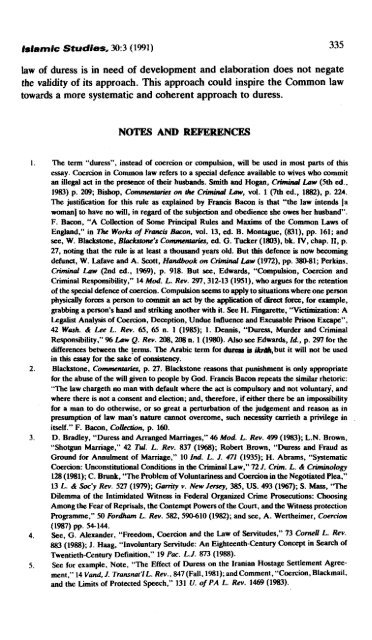LAW OF DURESS IN ISLAMIC LAW AND COMMON LAW: A ...
LAW OF DURESS IN ISLAMIC LAW AND COMMON LAW: A ...
LAW OF DURESS IN ISLAMIC LAW AND COMMON LAW: A ...
Create successful ePaper yourself
Turn your PDF publications into a flip-book with our unique Google optimized e-Paper software.
law of duress is in need of development and elaboration does not negate<br />
the validity of its approach. This approach could inspire the Common law<br />
towards a more systematic and coherent approach to duress.<br />
NOTES <strong>AND</strong> REFERENCES<br />
The term "duress", instead of coercion or compulsion, will be used in most pans of this<br />
essay. Coercion in Common law refers to a special defence available to wives who commit<br />
an illegal act in the prcscnce of their husbands. Smith and Hogan, C M Low (5th 4..<br />
1983) p. 209; Bishop, Commmtariu on the C M Lmv, vol. 1 (7th ed., 1882). p. 224.<br />
The justification for this rule as explained by Francis Bacon is that "the law intends [a<br />
woman] to have no will, in regard of the subjection and obedience she owes her husband".<br />
F. Bacon, "A Collection of Some Principal Rules and Maxims of the Common Laws of<br />
England," in Thc Works of Francis Emon, vol. 13, ed. B. Montague, (831). pp. 161; and<br />
see, W. Blackstone, Blacksfone's Commentaries, ed. G. Tucker (18[n), bk. N, chap. 11, p.<br />
27, noting that the rule is at least a thousand years old. But this defence is now becoming<br />
defunct. W. Lafave and A. Scott, Handbook on Criminal Low (1972). pp. 3W81; Perkins.<br />
Criminal Law (2nd cd., 1969). p. 918. But see, Edwards, "Compulsion, Coercion and<br />
Criminal Responsibility," 14 Mod. L. Rev. 297,312-13 (1951), who argues for the retention<br />
of the special defence of coercion. Compulsion seems to apply to situations where one person<br />
physically form a person to commit an act by the application of direct force, for example,<br />
grabbing a person's hand and striking another with it. See H. Fingarette. "Victimization: A<br />
Legalist Analysis of Coercion, Deception, Undue Influence and Excusable Prison Excape",<br />
42 Wash. & Lee L. Rev. 65, 65 n. 1 (1985); 1. Dennis, "Duress, Murder and Criminal<br />
Responsibility," % Low Q. Rev. U)8.u#1 n. 1 (1980). Also see Edwards, Id.. p. 297 for the<br />
differences between the !ern. The Arabic term for duma b -but it will not be used<br />
in this essay for the sake of consistency.<br />
Blackstone, Commenfarics, p. 27. Blackstone reasons that punishment is only appropriate<br />
for the abuse of the will given to people by God. Francis Bscon repeats the similar rhetoric:<br />
"The law chargeth no man with default where the act is compulsory and not voluntaj, and<br />
where there is not a consent and election; and, therefore, if either there be an impossibility<br />
for a man to do otherwise, or so great a perturbation of the judgement and reason as in<br />
presumption-of law man's nature cannot overcome, such necessity cameth a privilege in<br />
itself." F. Bacon, Colkchbn, p. 160.<br />
D. Bradley, "Duress and Arranged Marriages," 46 Mod. L. Rev. 499 (1983); L.N. Brown,<br />
"Shotgun Marriage," 42 Tul. L. Rev. 837 (1%8); Robert Brown, "Dwess and Fraud as<br />
Ground for Annulment of Marriage," 10 Znd. L. J. 471 (1935); H. Abrams, "Systematic<br />
Coercion: Unconstitutional Conditions in the Criminal Law," 72 1. Crim. L. & Criminology<br />
128 (1981); C. Brunk. "The Problem of Voluntariness and Coercion in the Negotiated Plea,"<br />
13 L. & Soc'y Rev. 527 (1979); Gammty v. New Jew, 385, US. 493 (1967); S. Mass, '"The<br />
Dilemma of the Intimidated Witness in Federal Organized Crime Prosecutions: Choosing<br />
Among the Fear of Reprisals, the Contempt Powers of the Court, and the Witness protection<br />
Programme," 50 Fordham L. Rev. 582,590410 (1982); and see, A. Wertheimer, Coercion<br />
(1987) pp. 54144.<br />
See, G. Alexander, "Freedom, Coercion and the Law of Servitudes," 73 Cornell L. Rev.<br />
883 (1988); J. Haag, "Involuntary Servitude: An Eighteenth-Century Concept in Search of<br />
Twentieth-Century Definition," 19 Pac. L.J. 873 (1988).<br />
See for example. Note, "The Effect of Duress on the Iranian Hostage Settlement Agreement,"<br />
14 Vand, J. Tranmnl'l L. Rev., 847 (Fall, 1981); and Comment, "Coercion, Blackmail,<br />
and the Limits of Protected Speech," 131 (1. of PA L. Rev. 1469 (1983).
















